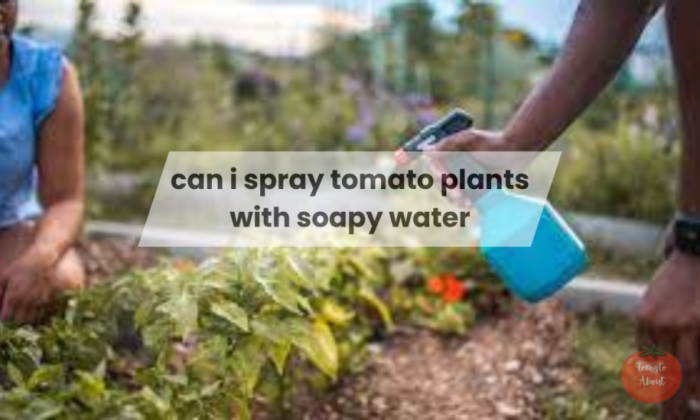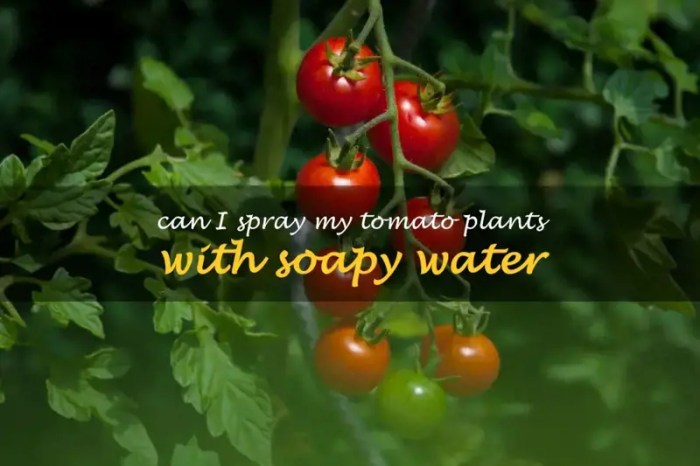Can You Spray Soapy Water on Tomato Plants?
Using Soapy Water on Tomato Plants: Benefits, Risks, and Application: Can You Spray Soapy Water On Tomato Plants

Source: tomatoabout.com
Can you spray soapy water on tomato plants – Soapy water, a readily available and seemingly innocuous solution, has gained popularity as a natural pest control method for tomato plants. However, understanding its benefits and drawbacks is crucial for effective and safe application. This article explores the various aspects of using soapy water on tomato plants, providing practical guidance for gardeners.
Benefits of Soapy Water for Tomato Plants
Soapy water, when properly prepared, offers a relatively safe and effective way to control certain pests on tomato plants. Its effectiveness stems from its ability to disrupt the pests’ respiratory systems and dehydrate them, leading to their demise. This method is particularly useful for soft-bodied insects.
The types of pests effectively controlled include aphids, spider mites, whiteflies, and mealybugs. Compared to chemical pesticides, soapy water presents a less toxic alternative, minimizing harm to beneficial insects and the environment. However, its effectiveness is generally less potent than targeted chemical insecticides, requiring more frequent applications and potentially less complete eradication.
A simple and effective recipe involves mixing 1-2 teaspoons of mild dish soap (avoiding those with added fragrances or chemicals) into one gallon of water. Always test the solution on a small section of the plant before widespread application to check for any adverse reactions.
Risks and Drawbacks of Using Soapy Water on Tomato Plants
While generally safe, using soapy water improperly can lead to negative consequences for tomato plants. Over-concentration of soap can damage plant leaves, causing browning or wilting. Using harsh soaps or applying the solution during intense sunlight can exacerbate this damage. Furthermore, while less harmful than chemical pesticides, soapy water can still negatively impact beneficial insects such as ladybugs, which prey on common tomato pests.
This disruption of the natural ecosystem can lead to a resurgence of pests in the long run.
| Method | Advantages | Disadvantages | Notes |
|---|---|---|---|
| Soapy Water | Natural, readily available, relatively inexpensive, less harmful to beneficial insects than chemical pesticides. | Can damage plant leaves if over-concentrated or applied improperly; less effective than some chemical pesticides; may need frequent applications; can harm beneficial insects if not used carefully. | Use mild dish soap, test on a small area first, avoid direct sunlight during application. |
| Chemical Pesticides | Highly effective against a wide range of pests; often provides longer-lasting protection. | Can harm beneficial insects and pollinators; can be toxic to humans and pets; can contaminate soil and water; potential for pesticide resistance development. | Use only as a last resort, follow label instructions carefully. |
Application Methods and Techniques, Can you spray soapy water on tomato plants

Source: shuncy.com
Applying soapy water effectively involves careful consideration of the method and timing. Spraying is the most common method, using a hand-held sprayer to ensure even coverage of the plant’s foliage. Dipping small plants or cuttings into a soapy water solution can also be effective. Wiping the leaves with a cloth soaked in the solution is suitable for smaller infestations. Thorough coverage is essential, targeting both the upper and lower leaf surfaces where pests tend to congregate.
Avoid spraying during the hottest part of the day to minimize the risk of leaf burn.
Tools and materials needed include a spray bottle or a cloth, measuring cups, and mild dish soap. Always prepare the solution fresh and avoid storing it for extended periods.
Types of Soap and Their Effectiveness
Different types of soap vary in their effectiveness against tomato plant pests. While mild dish soap is a readily available option, insecticidal soaps are specifically formulated for pest control and often contain additional ingredients that enhance their effectiveness. The choice of soap depends on the type of pest and the plant’s growth stage. Generally, a lower concentration of soap is recommended for young plants to minimize the risk of damage.
Using excessively high concentrations of any soap can damage the plants, so careful testing is recommended before widespread application. A chart illustrating specific soap types and concentrations for various pests would require extensive research and testing beyond the scope of this article, as effectiveness is influenced by numerous factors, including environmental conditions and pest life cycle stages.
Spraying soapy water on tomato plants can help control certain pests, but the type of soap matters. Before you do, consider the broader question of using diluted soaps on plants; a helpful resource on this is available if you check out this article on can you put dish water on plants to understand the potential benefits and risks involved with using dish soap.
Understanding this will help you determine the best approach for your tomato plants and avoid unintended harm.
Alternative Pest Control Methods for Tomatoes
Integrated pest management (IPM) emphasizes a holistic approach to pest control, prioritizing preventive measures and less harmful methods. This strategy involves combining several techniques to minimize the reliance on chemical pesticides. Companion planting, using plants that repel or attract beneficial insects, is a valuable component of IPM.
- Biological control: Introducing natural predators such as ladybugs or lacewings to control pest populations.
- Handpicking: Manually removing pests from plants.
- Physical barriers: Using row covers or netting to prevent pests from accessing plants.
- Crop rotation: Changing the location of tomato plants each year to disrupt pest life cycles.
- Maintaining plant health: Providing adequate water, nutrients, and sunlight to promote strong plant growth and resilience to pests.
Beneficial insects such as ladybugs, lacewings, and praying mantises are valuable allies in the fight against tomato pests. They prey on common tomato pests, helping to maintain a natural balance within the garden ecosystem.
Common Queries
Can I use any type of soap?
No, avoid harsh detergents. Mild dish soap or insecticidal soap is recommended.
How often can I spray soapy water?
Spray only as needed, typically every few days, depending on pest pressure. Avoid over-spraying.
What if I accidentally over-spray?
Rinse the plants thoroughly with water to dilute the soap. Monitor for any signs of leaf damage.
Is soapy water effective against all tomato pests?
No, it’s most effective against soft-bodied insects like aphids and spider mites. It may not be effective against all pests.




















